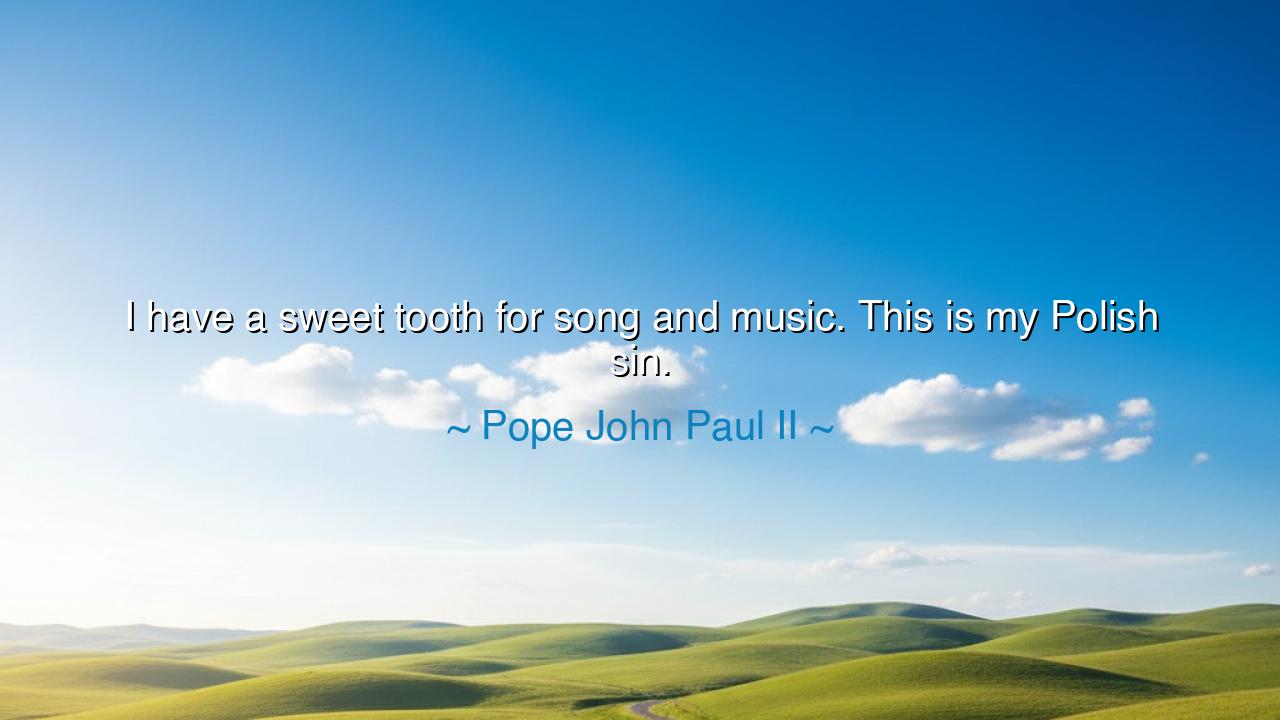
I have a sweet tooth for song and music. This is my Polish sin.






Hear the gentle yet profound words of Pope John Paul II, who confessed with humility and joy: “I have a sweet tooth for song and music. This is my Polish sin.” Though spoken with warmth and lightness, these words carry within them a truth about the soul, the homeland, and the sacred bond between people and music. For here, the Pope was not merely speaking of melody; he was speaking of memory, identity, and the divine sweetness that lives within song.
When he speaks of a “sweet tooth,” he reveals that his love for song and music was not a calculated choice, but a natural craving, a longing of the soul as irresistible as hunger itself. Just as the body delights in sweetness, so too does the spirit delight in the harmonies of music. It nourishes not the flesh, but the heart. And when he names it a “sin,” he does not speak of guilt, but of indulgence, of a passion so deep it feels almost mischievous in its joy.
By calling it his “Polish sin,” John Paul II ties this love of music to the soil of his homeland. For Poland, with its hymns, folk songs, and laments, carried a tradition of song as a vessel of endurance. During centuries of occupation, when its borders were erased and its people oppressed, Poland kept its spirit alive through music. To sing was to remember, to resist, to keep hope alive when freedom was denied. Thus, the Pope’s confession was not merely personal—it was national. His love of song was the inheritance of a people who found strength in melody.
History bears witness to this. During the Nazi occupation of Poland in World War II, when the nation was shrouded in darkness, underground theaters and secret concerts were held, where Poles gathered to sing forbidden hymns and folk songs. These melodies carried the soul of a people who refused to be silenced. Even in the death camps, prisoners composed and sang, finding fleeting moments of humanity in music. This was the “sweet tooth” of a nation: the unquenchable longing to sing, even in chains.
And when Karol Wojtyła, the young man who would become Pope John Paul II, grew in these years, he too was formed by this legacy. The chants of the Church, the folk songs of his people, the hymns of resistance—all were part of his spirit. Thus, when he later spoke of his love for music as his Polish sin, it was a remembrance of how melody carried both him and his nation through suffering into hope.
The lesson for us is clear: music is not mere entertainment, but food for the soul. It preserves identity, strengthens courage, and gives voice to what cannot be spoken. Like the Pope, we must cherish the songs of our people, the melodies that connect us to our ancestors, and the music that uplifts us in our darkest hours. To delight in song is no sin—it is a holy indulgence, a recognition of the divine gift that makes us human.
O children of tomorrow, learn from this: cultivate your own sweet tooth for music. When joy overwhelms you, let song give it wings; when sorrow burdens you, let melody carry it. Cherish the music of your culture, for it holds the wisdom and struggles of your people. And above all, let music remind you that even when the world seems heavy, there is sweetness to be found, beauty that endures, and harmony that binds us together.
So remember the words of Pope John Paul II: “I have a sweet tooth for song and music. This is my Polish sin.” It is not truly sin, but a blessing—proof that to be human is to crave beauty, to seek harmony, and to find in music the sweetest taste of eternity.






AAdministratorAdministrator
Welcome, honored guests. Please leave a comment, we will respond soon